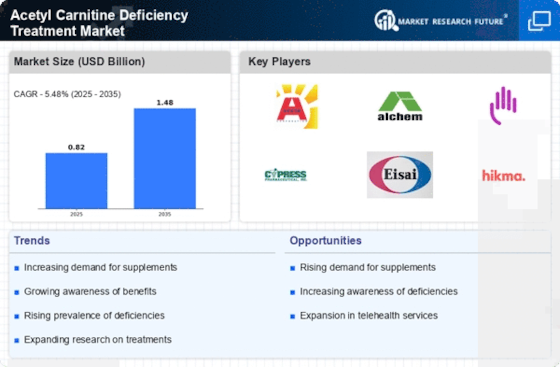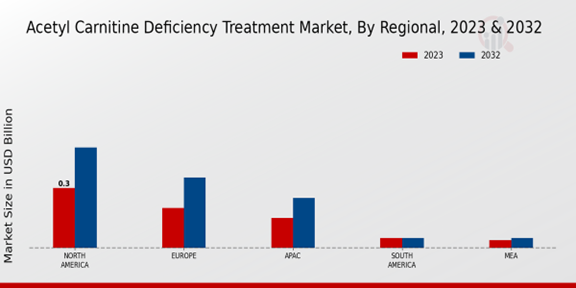The Acetyl Carnitine Deficiency Treatment Market is growing as metabolic disorders are on the rise and information about acetyl carnitine increases. As healthcare practitioners are becoming aware of its function related to energy production and cellular functions, there is a need for more complex therapies.
There is also increasing demand for acetyl carnitine therapies due to the increased ability to diagnose and perform clinical studies. Furthermore, the elderly population contributes to an increase in a range of conditions caused by an acetyl carnitine deficiency which leads to an increasing demand for effective therapies.
The acetyl carnitine segment is expected to expand due to growth opportunities in untapped markets. The FDA was unable to submit any new guidelines for the product, which suggests that such demand persists in emerging economies. The development of acetyl carnitine as part of numerous therapeutic strategies allows drug manufacturers to collaborate with healthcare institutions.
Also, other novel changes to drug combinations and delivery systems are underway to improve adherence and treatment outcomes. Expansion of personalized medicine provides further opportunities to players in the market, who are now able to make personalized medicine for their patient’s bathrooms and different genetic markers.
The contemporary perspective points out a growing trend favoring a multi-in-theory and practice type management of acetyl carnitine deficiency oriented around primary lifestyle changes and addition of non-drug measures. The trend of increasing interest in taking nutritional support in the form of medicinal or dietary supplements for preventive measures is changing the scope of the market.
The ideas trying to study the acetyl carnitine’s neuroprotective effects have rekindled enthusiasm for this compound in selecting strategies to combat aging and promote well-being. The focus on environmental sustainability in the business of pharmaceuticals is also gaining ground which compels these businesses to move to greener means of production methods.
Such trends also fit in the ongoing innovative changes across health systems which aim at addressing both the physical and mental health perspectives in the management of ailments associated with acetyl carnitine deficiency.
Acetyl Carnitine Deficiency Treatment Market Drivers
Growing Awareness of Acetyl Carnitine Deficiency Treatment
The increasing awareness around the benefits and functionalities of acetyl carnitine in treating deficiency disorders is a significant driver of growth within the Acetyl Carnitine Deficiency Treatment Market Industry. As more healthcare providers, patients, and caregivers understand the critical role that acetyl carnitine plays in energy metabolism and the potential impacts of its deficiency, there is an expected rise in diagnosis rates and treatment options.
This growing recognition is spurring further research and development to explore new therapeutic applications, leading to the evolution of treatment modalities. Furthermore, as lifestyle-related health issues proliferate, there is a recognition of the need for effective interventions to manage these conditions. This has led to a heightened focus on metabolic health solutions, of which acetyl carnitine is a vital component.
As the Acetyl Carnitine Deficiency Treatment Market expands, too will the level of industry investment in clinical studies, ultimately be translating to more comprehensive treatment products becoming available, thus reflecting ongoing industry growth.
Rising Incidence of Metabolic Disorders
The increase in the prevalence of metabolic disorders globally is a crucial driver of the Acetyl Carnitine Deficiency Treatment Market Industry. With conditions such as obesity, diabetes, and cardiovascular disease on the rise, there is an expanding population of individuals requiring effective metabolic health solutions.
Acetyl carnitine plays a significant role in fatty acid oxidation and energy production, making it a targeted therapy for patients suffering from these metabolic disorders. The correlation between increasing metabolic disorders and the demand for acetyl carnitine supplementation can lead to enhanced market growth as healthcare systems seek to provide effective treatments.
This trend presents opportunities for market players to innovate and expand their offerings in line with evolving patient needs.
Advancements in Biotechnology and Pharmaceutical Innovations
Recent advancements in biotechnology and pharmaceuticals are significantly influencing the Acetyl Carnitine Deficiency Treatment Market Industry. Innovative techniques in drug formulation and delivery methods are improving the efficacy and patient compliance of acetyl carnitine treatments. As research continues to uncover the multi-faceted effects of acetyl carnitine on various health conditions, the development of new formulations and dosage forms is expected to expand market opportunities for both existing and new entrants.
These advancements allow for personalized treatment approaches that can cater to specific patient needs, propelling market growth.
Acetyl Carnitine Deficiency Treatment Market Segment Insights
The increasing recognition of acetyl carnitine's role in energy metabolism and cognitive function suggests a growing demand for treatments addressing acetyl carnitine deficiency, potentially reshaping therapeutic approaches in neurology and metabolic disorders.
National Institutes of Health (NIH)























